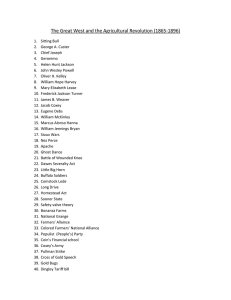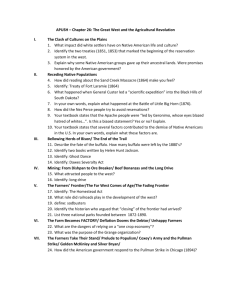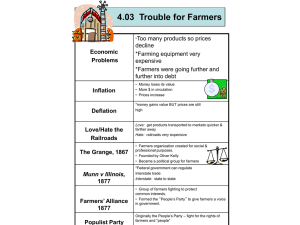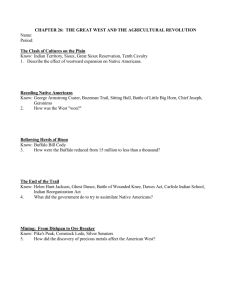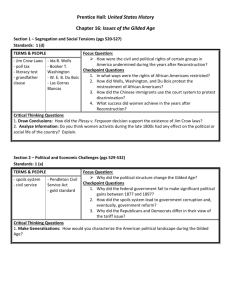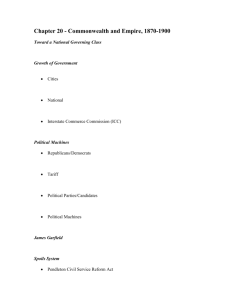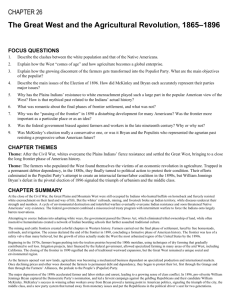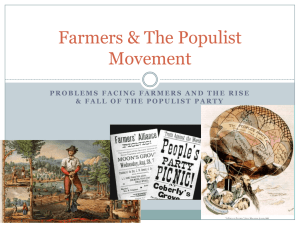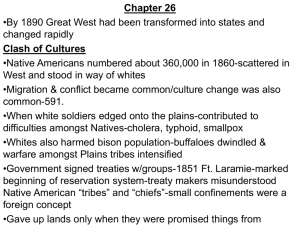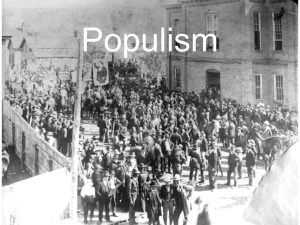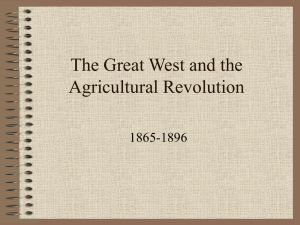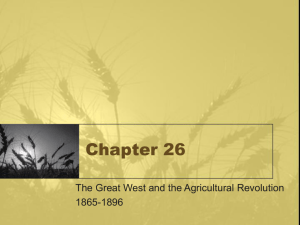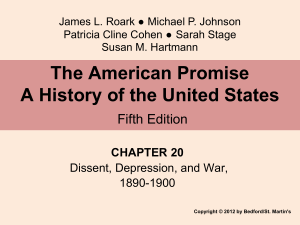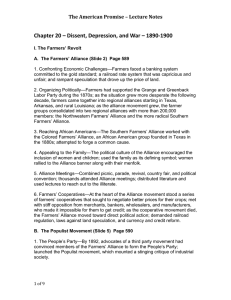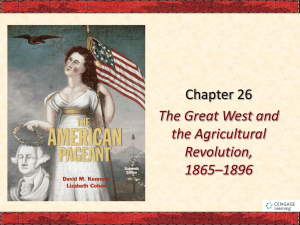the farmers* frontier - Madison County Schools
advertisement
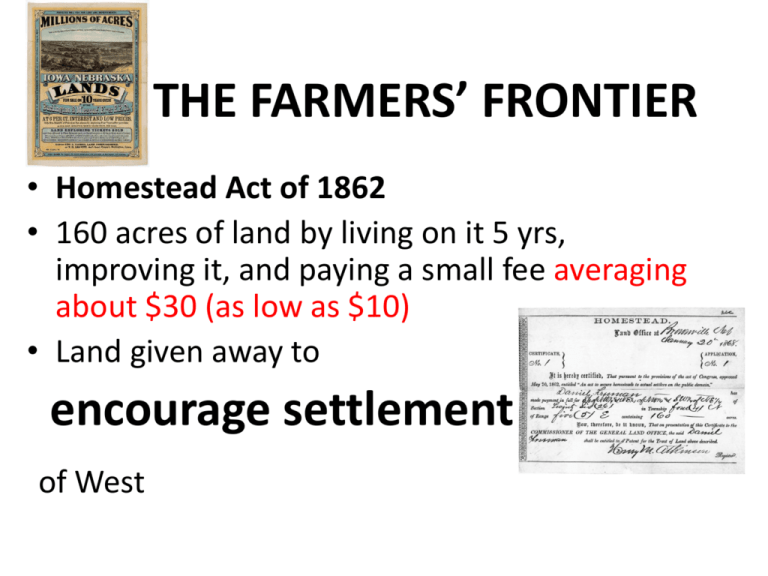
THE FARMERS’ FRONTIER • Homestead Act of 1862 • 160 acres of land by living on it 5 yrs, improving it, and paying a small fee averaging about $30 (as low as $10) • Land given away to encourage settlement of West Cont. • About 500,000 pioneer families migrated west. • 2/3 - forced to give up - inadequate plots and drought, hail, and ravage from insects. • Railroads played a role in taming the West. • Improved irrigation techniques • Flour-milling process by John Pillsbury of Minneapolis, increased grain demand THE FAR WEST COMES OF AGE • 1888-1889: 6 new States • Oklahoma Land Rush, April 22, 1889 Nearly 100, 000 "boomers" – "Sooners" – land-grabbers who claimed land illegally before land rush began. • In 1890, census - first time in U.S. History, a frontier line no longer existed! – Once frontier was gone, farmers could not move west in significant numbers. THE FADING FRONTIER • "Safety valve" theory - Americans known for their mobility – farmers rarely remained in same place –hard times - moved west. • Free acreage did lure immigrant farmers who would otherwise have lived in overcrowded eastern slums. There was the POSSIBILITY of westward migration. • Frederick Jackson Turner - argued closing of the frontier had ended an era in American history. THE FARM BECOMES A FACTORY • Farmers - single cash-crop • World’s breadbasket • Massive migration of white and black Americans out of Southern Cotton Belt. • Commercial agriculture run by big businesses – “Bonanza Farms” DEFLATION DOOMS THE DEBTOR • "Crop lien" system - impossible for farmer to get out of debt. • Deflated currency, low food prices chief worries among farmers. • Natural disasters – bugs, floods, drought • Government-added woes: – – – – Farmers’ land often overvalued – high Protective tariffs trusts Railroads – high rates ignored taxes UNHAPPY FARMERS • Mother Nature unleashed powerful forces on the farmers: – Grasshoppers and cotton-boll weevil – Floods led to erosion in south – Droughts in west THE FARMERS TAKE THEIR STAND • National Grange of the Patrons of Husbandry (The Grange) 1867 - social & educational activities – Oliver Kelley • Granger (state) Laws - wanted gov't control over big business to benefit the people. • Munn vs. Illinois (1877) • Wabash case (1886) • Greenback Labor Party Rise of Populist Party • Farmers’ Alliances - like Grangers, sponsored social events, political action, cooperatives, and gov't regulation of railroads and manufacturers. • The People’s Party (Populist Party) early 1890s through the Farmer’s Alliances (started in Topeka, Kansas). • Ignatius Donnelly • Mary E. Lease Populist Party convention held at Columbus, Nebraska, July 15, 1890 COXEY’S ARMY AND THE PULLMAN STRIKE • Coxey’s Army (1894) - unemployed on Washington, DC – Coxey’s platform included a demand for gov’t to relieve unemployment by an inflationary public works program + increase money supply by $500 million • Pullman Strike, 1894 Eugene V. Debs helped organize American Railway Union – First time gov’t used an injunction to break a strike GOLDEN MCKINLEY AND SILVER BRYAN • Election of 1896 • William McKinley - Republican • William Jennings Bryan – Democrat • Democrats refused to endorse Cleveland for his silver-purchase repeal, Pullman Strike action, and Morgan bond deal; move suicidal to the party’s hopes in 96’ -- Cleveland left office an extremely unpopular man. Cynical political cartoon of the speech from the magazine Judge. • Cross of Gold speech given at Democratic convention in Chicago -- "We will answer their demands for a gold standard by saying to them: ‘You shall not press down upon the brow of labor this crown of thorns, you shall not crucify mankind upon a cross of gold." • Democratic platform: unlimited coinage of silver (16 to 1). Bryan - People’s party CLASS CONFLICT: PLOWHOLDERS VERSUS BONDHOLDERS • Silver issue at the forefront • McKinley defeated Bryan 271-176 • McKinley won Northeast and North (HOW?????); Bryan in South & West • Legacy of Populism - Populism failed as a 3rd Party • Populist ideas that carried forward during the Progressive Era (1900-1920): railroad legislation, graduated income tax, direct election of Senators, initiative, referendum and recall REPUBLICAN STAND-PATTISM ENTHRONED • Tariff rates – 46.5% • Gold Standard Act of 1900 - Paper money was to be redeemed freely in gold; end to prosilver movement
